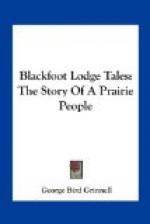Then the deer said: “Yes, you have beaten me on the prairie, but that is not where I live. I only go out there sometimes to feed, or when I am travelling around. We ought to have another race in the timber. That is my home, and there I can run faster than you can.”
The antelope felt very big because he had beaten the deer in the race, and he thought wherever they might be, he could run faster than the deer. So he agreed to race in the timber, and on this race they bet their dew claws.
They ran through the thick timber, among the brush and over fallen logs, and this time the antelope ran slowly, because he was not used to this kind of travelling, and the deer easily beat him, and took his dew claws.
Since then the deer has had no gall, and the antelope no dew claws.
[NOTE. A version of the first portion of this story is current among the Pawnees, and has been printed in Pawnee Hero Stories and Folk Tales.]
TWO WAR TRAILS
I
Many years ago there lived in the Blood camp a boy named Screech Owl (A’-tsi-tsi). He was rather a lonely boy, and did not care to go with other boys. He liked better to be by himself. Often he would go off alone, and stay out all night away from the camp. He used to pray to all kinds of birds and animals that he saw, and ask them to take pity on him and help him, saying that he wanted to be a warrior. He never used paint. He was a fine looking young man, and he thought it was foolish to use paint to make oneself good looking.
When Screech Owl was about fourteen years old, a large party of Blackfeet were starting to war against the Crees and the Assinaboines. The young man said to his father: “Father, with this war party many of my cousins are going. I think that now I am old enough to go to war, and I would like to join them.” His father said, “My son, I am willing; you may go.” So he joined the party.
His father gave his son his own war horse, a black horse with a white spot on its side—a very fast horse. He offered him arms, but the boy refused them all, except a little trapping axe. He said, “I think this hatchet will be all that I shall need.” Just as they were about to start, his father gave the boy his own war headdress. This was not a war bonnet, but a plume made of small feathers, the feathers of thunder birds, for the thunder bird was his father’s medicine. He said to the boy, “Now, my son, when you go into battle, put this plume in your head, and wear it as I have worn it.”




